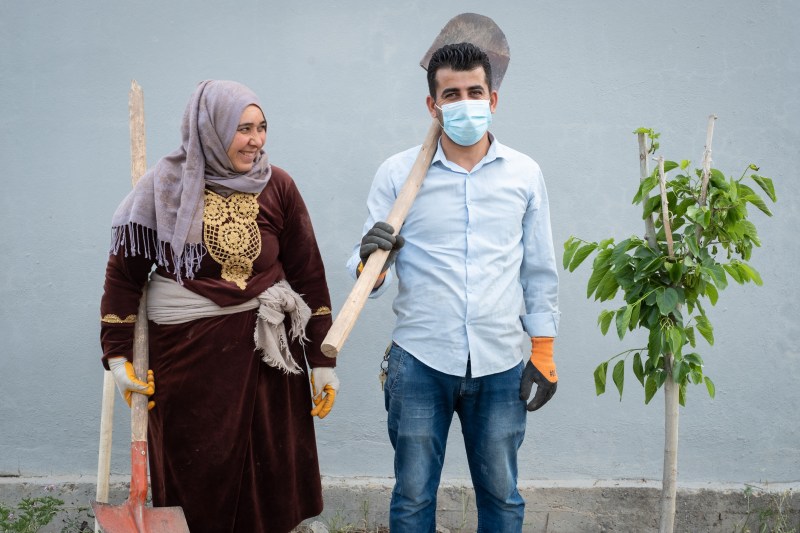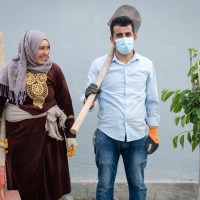Refugees
On Earth Day, A Chance to Heal the Land & Hearts of Refugees
Today we picked up shovels to make a 100-year investment in our refugee friends and the land they now call home.

A 100-year investment happened today. Not in a bank or bitcoin. No, this was an investment in neighbors, in the community, and the land. This is the kind of help that lasts.
At first glance, it seemed like an ordinary, underwhelming task—Aziza and her neighbor Yaser took up their shovels, dug a deep, wide hole, and planted a tree. Around the tree, they lowered the root balls of young berry bushes and flowers into smaller holes they made in the ground. Aziza’s son ran to get the water that soaked all the roots into their new homes.
Yes, this trio of neighbors spent today, Earth Day morning, in their refugee camp, planting a community garden. But it was more than that. They were planting a garden their grandchildren can eat from a hundred years from now.
We’ve walked with these friends for years—displaced Syrians now living in this camp for refugees. Civil war made them flee home. It took everything they owned: homes built by their fathers, orchards planted by grandfathers, with knowledge passed down by their great-grandfathers.
For years, we’ve helped them start businesses in their temporary homes, so they could support their families. But as the years passed, it became clear that most of these families will never be able to return to Syria.
This camp seems destined to become their forever home.
“The camp is listed by the UN as a transition camp with the plan to help it become a permanent village within the community,” explained our permaculturist Kayla Hatcher. “After our five-year investment in jobs in this community, it’s the perfect place to pilot a regenerative agriculture project that could have 100 years of impact if cared for correctly.”
This garden is designed to heal the land as well as the hearts of our refugee friends.
The families in this camp have their most basic needs met now. They have small homes that still retain the footprint of the UN tents that first sheltered them when they ran from war. There are jobs and businesses—many of them made possible by our monthly giving community of peacemakers. There are schools and a clinic. But there is also a guarded fence around the camp.
Inside each family’s front door there is a home. But this place isn’t yet a robust community. It’s missing an important ingredient—rootedness, in the form of a food forest.
“Over the next 5 to 15 years the food forest will be made up of over 100 fruit trees and many edible greens and small berry bushes. Regenerative agriculture and specifically food forest systems—these are 100-year plans: constantly developing. This design is for the people, for the soil, for the insects, the snakes, the birds, and any species, including the microorganisms, that will each hold an integral role in the system.”
But this is no ordinary plot of land, providing nourishment for the body only. We listened to our friends here in this camp, women who have worked hard to provide for their families with skills in sewing, crochet, and candle making. We asked what their lives were still missing, and what they needed for this place to feel like home.
It took everything they owned: homes built by their fathers, orchards planted by grandfathers, with knowledge passed down by their great-grandfathers.
They were quick with their answer: a place to rest, green space, and the smell of jasmine which perfumes so many Syrian streets. They miss having a place to meet together, a space where their children can play together nearby, where time is marked by the natural seasons of a garden.
In this part of Iraq, the land is semi-arid. There is rain in the winter, but none in the summer. Successful agriculture depends on a mixture of traditional planting techniques, thoughtful water use, and, above all, care for the land. This garden is designed to heal the land as well as the hearts of our refugee friends. It is an undertaking in regeneration.
That means giving back more than you take. In Kayla’s words, “Regeneration is about the land, microbes, animals, people, and the communities that connect them.”
Land that allows them to grow some of their own food. Land that will give them a sense of connection to the wider community. Land where they can teach their children and grandchildren about what it means to create a life together.
This Earth Day, know that Aziza and Yasser are proud of their work, tending this land. They are investing in their future. Their neighbors’ futures. They are growing a framework of stability for refugees who need it most today—and one that will last for the generation that comes after them.
You can be part of this literally world-remaking work. You can have an impact that will last for generations when you join our community of peacemakers and give monthly. You regenerate a land marred by war. You can revitalize the future for refugees.

